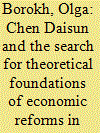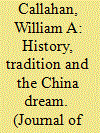| Srl | Item |
| 1 |
ID:
181412


|
|
|
|
|
| Summary/Abstract |
Chen Daisun received his economic education in the United States in the 1920s. In the initial period of reforms, he proposed to selectively borrow from Western economics, including methods of quantitative analysis, experience in managing enterprises and using the market mechanism, and research on the negative consequences of industrialization. His recommendations combined the Marxist approach with a deep knowledge of modern economic theory. The scholar made a significant contribution to the return of the study of foreign economic thought in China. The author concludes that Chen Daisun's appeal to proceed from national specifics and try to create a highly developed Chinese economic science remains relevant in the current ideology of the PRC.
|
|
|
|
|
|
|
|
|
|
|
|
|
|
|
|
| 2 |
ID:
141450


|
|
|
|
|
| Summary/Abstract |
How will China influence world politics in the twenty-first century? Many people answer this question by looking to Chinese history, and particularly to traditional models of Chinese world order. This essay seeks to complicate this question by asking which history, and which tradition? While it is common to look at China's pre-modern history as ‘tradition’, this essay argues that we also need to appreciate how ‘socialism’ is treated as a tradition alongside Chinese civilization. It does this by examining how China's public intellectuals appeal to two seemingly odd sources: Mao Zedong's 1956 speech ‘Strengthen Party Unity and Carry Forward Party Traditions’, and the ‘Great Harmony’ passage from the two millennia-old Book of Rites. It will argue that these two passages are employed as a way of salvaging socialism; the ideological transition thus is not from communism to nationalism, but to a curious combination of socialism and Chinese civilization. This new socialist/civilization dynamic integrates equality and hierarchy into a new form of statism, which is involved in a global competition of social models. Or to put it another way, what these two passages have in common is not necessarily a positive ideal, but a common enemy: liberalism, the West and the United States.
|
|
|
|
|
|
|
|
|
|
|
|
|
|
|
|